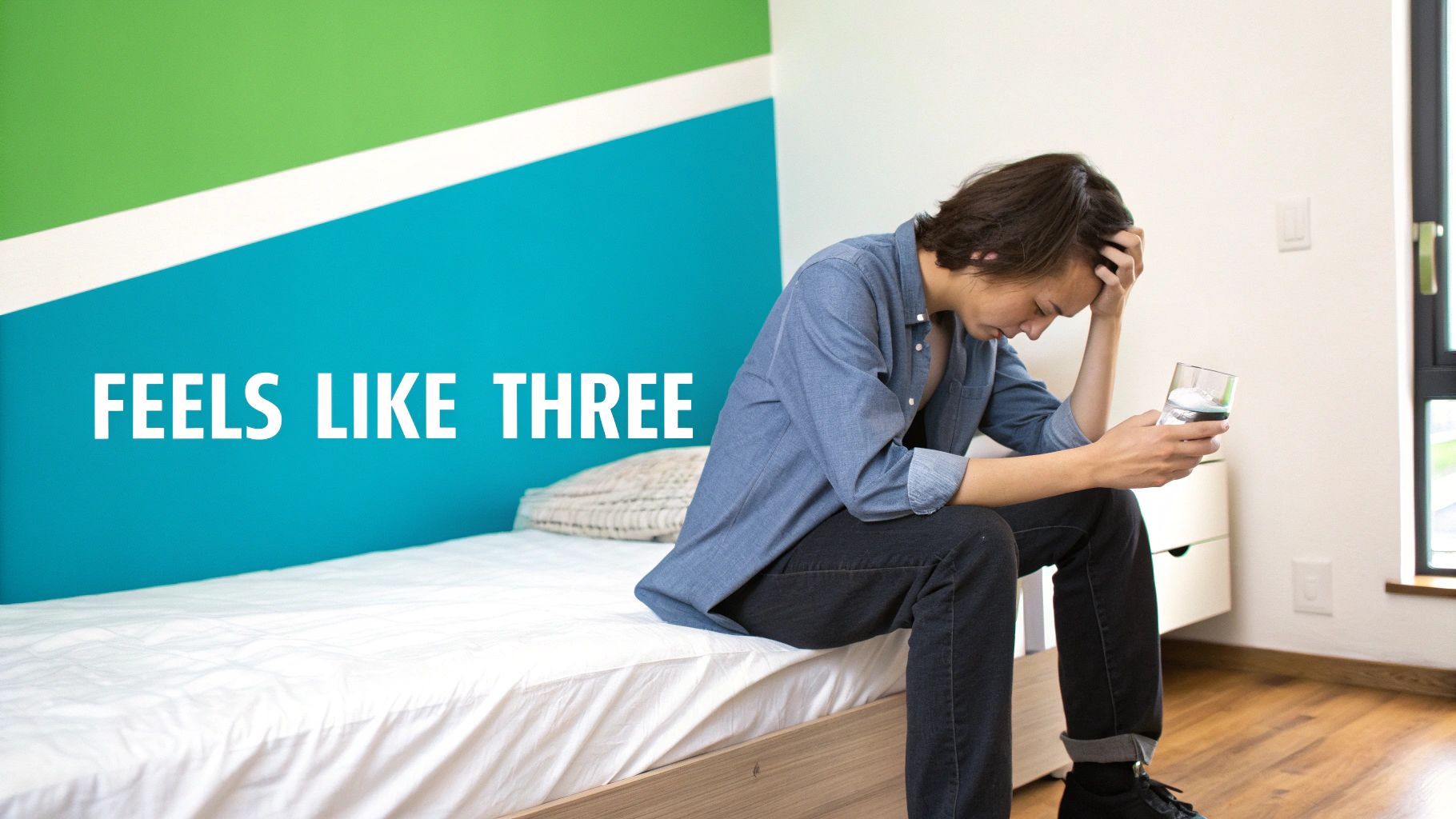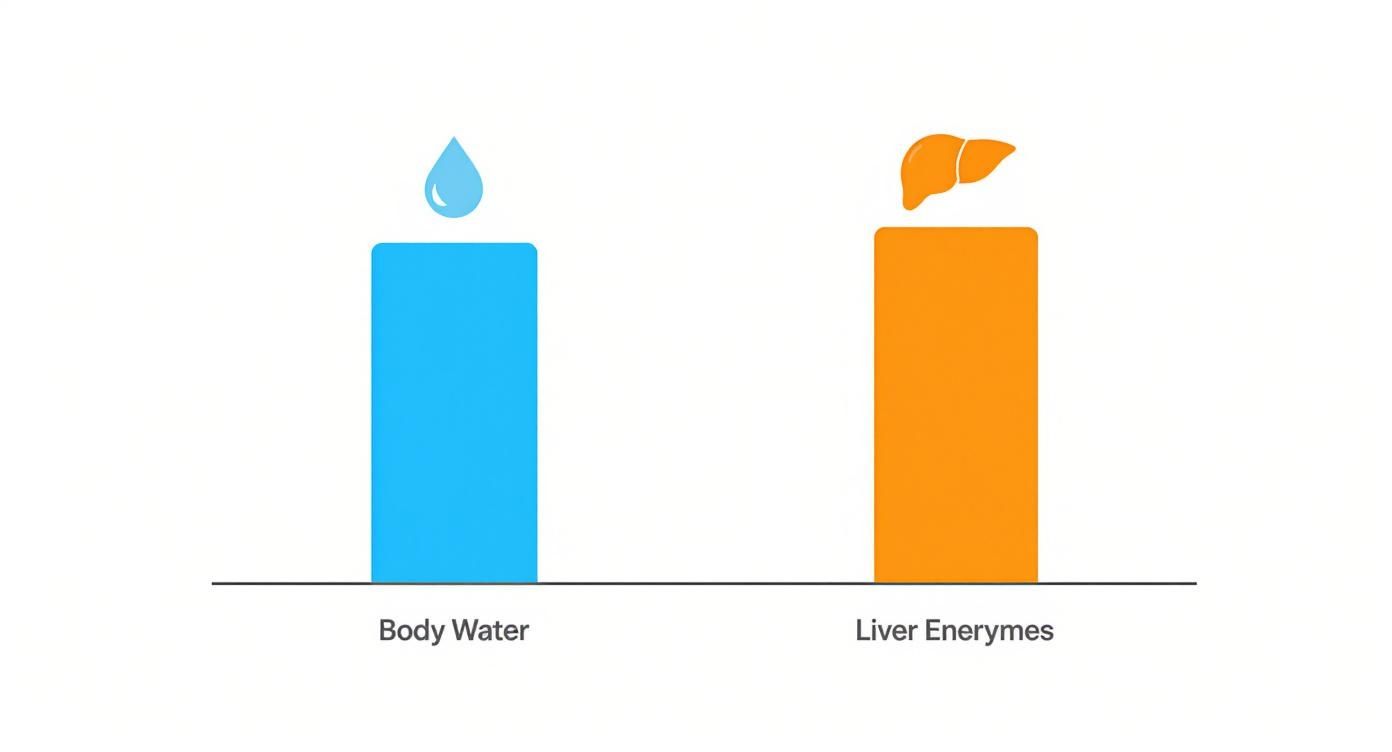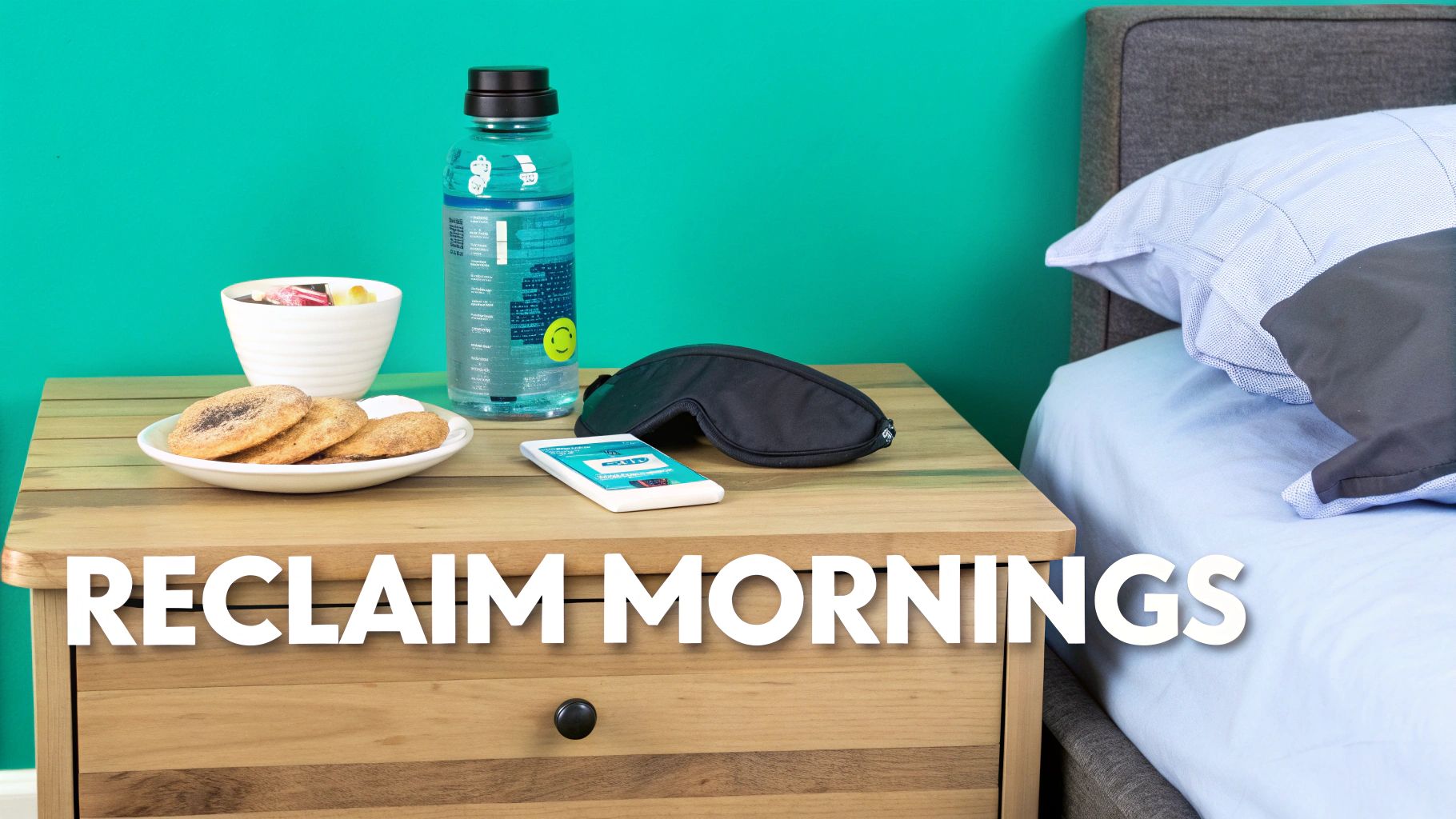

· By Annemarie
why do hangovers get worse with age: causes and tips
It’s a feeling that’s become all too familiar for many of us. You have one, maybe two, glasses of wine with dinner and wake up feeling like you spent the night doing shots in college. If you’ve ever wondered why that one drink now feels like three, you’re definitely not alone.
This isn't just in your head—it's a real, physiological shift happening in your body.

Think of your body in your early twenties as a brand-new, high-performance engine. It’s efficient, it’s resilient, and it bounces back from pretty much anything you throw at it. As we get older, that engine naturally loses a bit of its horsepower and needs more careful maintenance. The same thing happens with how your body handles alcohol.
The Key Players in Your Worsening Hangovers
So, why are hangovers hitting so much harder these days? It all comes down to a few key biological changes. Your body isn’t suddenly rejecting alcohol; it’s just processing it very differently than it used to.
Here are the main culprits:
- A Less Efficient Liver: Your liver is your body's main detox center, but as you age, it gets a little slower at breaking down alcohol and its nasty byproducts.
- Changes in Body Composition: We tend to lose muscle mass and hold less water as we get older, which has a direct impact on how concentrated alcohol becomes in our system.
- Slower Immune Response: The inflammation that alcohol triggers can be more intense and stick around for longer as we age.
Put these factors together, and you’ve got the perfect storm for a truly miserable hangover. A drink that your body could easily handle a decade ago now puts a much bigger strain on your system, leading to those killer headaches, deep fatigue, and waves of nausea.
But this shift doesn't mean you have to give up your favorite cocktail for good. It’s really about learning to work with your body instead of against it. By understanding what’s changing under the hood, you can start making smarter choices that let you enjoy your evenings without dreading the morning after.
Your Body's Changing Relationship With Alcohol
Ever wonder why the same number of drinks that left you feeling fine in your twenties now leaves you feeling like you've gone ten rounds with a heavyweight champ? It’s not just your imagination. As the years go by, your body subtly rewires how it handles everything, and alcohol is no exception. The old rules just don't apply anymore.
Two of the biggest culprits behind this cruel shift are a drop in your body’s water content and a natural slowdown in your liver's processing power.
Less Water Means Higher Concentration
Think of your body in your twenties like a big, thirsty sponge. When you have a drink, the alcohol spreads out and gets diluted across a pretty large surface area. But as you get older, that sponge naturally shrinks a bit and doesn't hold as much water.
So what happens now? When you pour that same drink onto the smaller sponge, the liquid becomes way more concentrated.
This is a perfect picture of what’s happening in your bloodstream. With less water in your system, that same glass of wine or pint of beer leads to a higher blood alcohol concentration (BAC) than it did a decade ago. A higher BAC means alcohol's not-so-fun effects—like dehydration and inflammation—get turned up to eleven, paving the way for a monster hangover.
It’s a well-documented change. As we age, our total body water decreases, which means alcohol packs a bigger punch. Add a sluggish liver to the mix, and you've got the perfect storm for a rough morning after. You can find more on the science behind this at Healthline.com.
Your Liver's Slowing Production Line
While your body's water content sets the stage, your liver is where the real action happens. Your liver is basically a two-step factory designed to break down alcohol, using a couple of crucial enzymes to get the job done.
- Step One: First up, an enzyme called alcohol dehydrogenase (ADH) gets to work, converting alcohol into a seriously toxic compound called acetaldehyde. This guy is the primary villain behind those classic hangover symptoms like headaches and nausea.
- Step Two: Right on cue, a second enzyme, aldehyde dehydrogenase (ALDH), swoops in to transform that toxic acetaldehyde into a harmless substance called acetate. Your body can then easily flush it out.
Here's the problem: as you get older, your liver’s production of these vital enzymes starts to slow down. That means the whole assembly line gets sluggish. Acetaldehyde, the toxic troublemaker, ends up hanging around in your system for way too long before it can be neutralized.
The longer it lingers, the more damage it does—and the worse you feel the next day. To get a closer look at this whole process, check out our guide on how your body processes drinks.
The Surprising Truth About Hangovers and Age
We’ve all been there. You have a couple of drinks, wake up the next day, and your aching head and queasy stomach make you swear that hangovers get worse with age. But what if I told you the science tells a fascinatingly different story?
The reality of how getting older impacts hangovers is way more complex than just feeling rougher after a night out. In fact, large-scale studies completely flip that common belief on its head, suggesting your worst hangovers might actually be behind you.
What the Research Actually Says
It might sound strange, but major health studies consistently find that younger adults report more frequent and more intense hangovers after heavy drinking. It's not just a statistical blip.
So, why the disconnect between how we feel and what the data shows? This is the core of understanding the real relationship between hangovers and aging.
A huge Danish study of 51,645 people aged 18 to 94 gave us some of the best insight. Researchers discovered that the chances of getting a severe hangover actually go down as we get older. The study found the likelihood of a nasty hangover after binge drinking was highest in men aged 18 to 29, and it steadily dropped off from there. You can dig into the data yourself in the full research on hangovers and aging.
Reported Hangover Severity by Age Group (Danish Study)
This table breaks down the findings from the Danish Health Examination Study. It shows just how much the odds of a severe hangover decrease for men after a night of binge drinking as they move into older age brackets.
| Age Group | Increased Likelihood of Severe Hangover (Compared to 60+) |
|---|---|
| 18–29 | 202% more likely |
| 30–39 | 132% more likely |
| 40–49 | 73% more likely |
| 50–59 | 30% more likely |
As you can see, the drop is pretty dramatic. The youngest group is more than 200% more likely to report a severe hangover than the 60-and-over crowd.

This infographic gets to the heart of the biological reasons we feel worse. As we age, our bodies simply hold less water, and our liver enzymes don't work as efficiently—a perfect recipe for feeling alcohol's effects more intensely.
Reconciling Feeling vs. Fact
Okay, so if the big studies say younger people get worse hangovers, why does your body feel like it's been hit by a truck after two glasses of wine when it could handle a whole bottle in college?
The answer isn't just one thing. It’s a mix of smarter habits, changing responsibilities, and a simple shift in perspective.
- You've Learned Your Lesson: Older, wiser drinkers tend to know their limits. They’ve had a few rough mornings and unconsciously drink less or pace themselves better.
- Life Gets in the Way: A 22-year-old can sleep until noon to recover. A 40-year-old has kids to get to school or a 9 AM meeting. That makes even a mild hangover feel a hundred times worse.
- The Contrast is Sharper: When you're older, the responsibilities of daily life make any level of feeling "off" seem much more significant. Feeling great is the norm, so feeling hungover is a major disruption.
In short, while the clinical severity of a hangover might be lower according to the data, the real-world impact on your life feels much, much higher. Your body just doesn't bounce back like it used to, and even a minor hangover can completely derail your day.
To really get a handle on this, it helps to understand what’s happening in your body. If you want a deeper biological dive, you can check out our guide on what causes hangovers. It’s this combination of slowing biology and a more demanding lifestyle that creates the perfect storm for feeling worse, no matter what the statistics say.
How Adulting Amplifies Your Hangovers

While your internal biology definitely sets the stage, the realities of modern adult life are what can truly turn a mild hangover into a day-ruining ordeal. The physiological changes we've been talking about are really only half the story. The other half is you, trying to navigate a world of responsibilities that just didn't exist in your college days.
It’s less about your body’s raw ability to recover and more about the demanding environment it's forced to do it in. Think about it: the pressures of a career, family duties, and just chronic stress create a backdrop that makes bouncing back from anything a lot harder.
The Shrinking Recovery Window
Remember when the only thing on your agenda after a late night was sleeping until noon and maybe grabbing some greasy food? For most of us, that luxury is a distant, beautiful memory. Today, recovery has to happen on a much, much tighter schedule.
Waking up at the crack of dawn to get kids ready for school, logging into an 8 AM video call, or just facing a mountain of weekend errands makes even a minor headache feel completely debilitating. There's just no buffer zone anymore.
Your body is desperately trying to manage the inflammatory and dehydrating effects of alcohol, while your mind is already stressing about deadlines and duties. This clash is a huge reason hangovers feel so much worse with age in terms of their real-world impact.
This constant lack of downtime means your system is always playing catch-up, which just makes feelings of fatigue and irritability that much more intense.
Lifestyle Factors That Pour Fuel on the Fire
Beyond a jam-packed schedule, several other parts of being an adult conspire to make your mornings miserable. These factors often interact with alcohol in ways that just compound its negative effects.
Consider how these common "adulting" realities mess with your recovery:
- Chronic Stress: High levels of the stress hormone cortisol can seriously mess with your sleep and slow down your body's natural repair processes. Adding alcohol to an already stressed-out system is like pouring gasoline on a smoldering fire.
- Inconsistent Sleep: Juggling work, family, and a social life often means sleep takes a backseat. But quality sleep is absolutely critical for cellular repair and detoxification. Even a small deficit can make hangover symptoms feel way more severe.
- Diet and Exercise Habits: An inconsistent diet or skipping workouts can weaken your body's overall resilience. A well-nourished, physically active body is simply better equipped to handle the metabolic stress of processing alcohol.
- Medications: As we get older, we're more likely to be taking medications for various health conditions. A lot of common prescriptions can interact with alcohol, affecting how it's metabolized and making side effects much worse.
At the end of the day, your body's recovery systems are being pulled in a million different directions. It's not just fighting the effects of last night's drinks; it's also battling stress, sleep deprivation, and all the other pressures of life. This multi-front war is what leaves you feeling so drained and makes the morning after feel so much harsher than it ever did before.
Practical Strategies to Reclaim Your Mornings

Alright, knowing the science behind why hangovers hit harder with age is one thing, but actually doing something about it is how you get your mornings back. It’s time to graduate from the "just chug water before bed" advice of our twenties and get a little more strategic.
This isn't about calling it quits on your social life. Far from it. It’s just about being smarter and more intentional so you can enjoy a few drinks without a full-day penalty.
Drink More Mindfully
It all starts with how you drink. If you slow your roll just a bit, you give your liver—which we now know gets a little slower with every birthday—a fighting chance to keep up.
So instead of powering through drinks, actually taste them. A super simple but effective trick? Alternate every alcoholic drink with a big glass of water. It keeps you hydrated and naturally pumps the brakes on your consumption, stopping your system from getting totally overwhelmed.
Prioritize Strategic Hydration
Water is your best friend in the fight against a hangover, but you have to be smart about when you bring it into the picture. Waiting until the next morning when your head is already pounding is way too late.
- Before You Go Out: Start hydrating hours before you even think about having a drink. Think of it as creating a solid, hydrated foundation for your body to work from.
- During the Night: Like we said, make water your plus-one. For every cocktail, beer, or glass of wine, have a glass of H2O. No exceptions.
- Before Bed: End the night with one last big glass of water to help offset alcohol’s dehydrating effects while you sleep.
If you really want to level up your hydration game, check out our guide on the best way to rehydrate after drinking.
Fuel Your Body Wisely
We’ve all been there, but drinking on an empty stomach is a total rookie move—and the consequences get much steeper as you get older. Food in your stomach slows down how quickly alcohol hits your bloodstream, which is exactly what you want.
Aim for a real meal with a good mix of protein, healthy fats, and complex carbs before you head out. This combo gives you sustained energy and helps keep your blood sugar from going on a rollercoaster.
As our approach to drinking evolves, so should our strategies for preventing the aftermath. What worked in our 20s often falls short later in life.
Practical Hangover Prevention Strategies for Different Ages
| Strategy | In Your 20s (Typical Approach) | In Your 30s & 40s+ (Smarter Approach) |
|---|---|---|
| Pacing | Drinking quickly to "get the party started." | Savoring drinks; alternating with water to slow down. |
| Hydration | Chugging a glass of water before passing out. | Hydrating before, during, and after drinking. |
| Food | A slice of late-night pizza after drinking. | Eating a balanced meal before the first drink. |
| Sleep | Staying out late and crashing for a few hours. | Prioritizing 7-8 hours of quality, restorative sleep. |
| Support | "Toughing it out" the next day. | Using smart supplements to support the body's recovery. |
The key takeaway? A little bit of planning and mindfulness can make a world of difference in how you feel the next day.
Support Your System with Modern Solutions
Even when you do everything right, sometimes your body just needs an extra boost. For health-conscious drinkers, this is where modern, on-the-go remedies can be a game-changer.
Formulated with natural ingredients, these supplements are designed to support your body's natural detox processes. They provide targeted nutrients to help your liver do its job and replenish what a night of drinking can strip away.
And finally, never, ever underestimate the power of a good night's sleep. Alcohol messes with your sleep cycle, especially that deep REM sleep you need to feel refreshed. Making sure you get a full night of rest is a non-negotiable part of bouncing back, allowing your body the time it needs to repair and hit the reset button.
Answering Your Questions: Hangovers and Getting Older
Navigating hangovers as you get older can feel like you're trying to solve a puzzle. You know the pieces have changed, but it’s not always clear how they fit together anymore. To help clear things up, we've gathered answers to some of the most common questions about the link between aging and that dreaded morning-after feeling.
Getting your head around these details is the first step toward making smarter choices that actually work for your body right now.
Does The Type of Alcohol I Drink Make Hangovers Worse As I Age?
Absolutely. The kind of alcohol you choose can make a huge difference, especially as the years go by. Darker liquors like whiskey, red wine, and brandy are packed with congeners, which are just chemical byproducts from the fermentation process. These little compounds are famous for making hangovers feel so much worse—we're talking monster headaches and next-day fatigue.
On the flip side, clearer spirits like vodka, gin, and white rum have way fewer congeners. Since your body gets a little less efficient at processing alcohol and all its baggage over time, you’ll probably find you're more sensitive to these compounds. That means a glass of bourbon today might leave you feeling way rougher than it would have a decade ago.
If Studies Show Hangovers Get Better With Age, Why Do I Feel Worse?
This is the big one that confuses so many people. It’s true—large-scale studies show that fewer older adults report having "severe" hangovers. But your real-life experience probably feels the complete opposite, and there are a few very practical reasons for that.
The disconnect isn't in how bad the hangover is, but in how bad it feels. While you might technically have fewer clinically severe hangovers, each one just hits your life so much harder than it did back in the day.
Here’s why you feel worse, even if the data says otherwise:
- Your Bounce-Back Game Is Weaker: Your body just doesn't recover like it used to, thanks to those changes in your metabolism and body composition.
- Your Lifestyle Has No Chill: You probably can't just sleep it off until noon anymore. Early mornings, a job, kids, and other responsibilities make even a mild hangover feel like a full-blown crisis.
- The Contrast Is Sharper: The gap between feeling 100% and feeling even slightly hungover is way more noticeable when you have a lot more on your plate.
Can I Train My Body to Handle Alcohol Better As I Get Older?
You can't exactly turn back the biological clock, but you can definitely pick up smarter habits to help your body handle a night out. The goal isn't to "train" your body to party like a 21-year-old again, but to adapt your strategy to your body's current reality.
Think of it like building a stronger foundation for your health. When you focus on the big picture—staying hydrated every day, keeping your muscle mass up with exercise, and getting solid sleep—you create a much more resilient system. Then, when you do decide to have a few drinks, simple moves like pacing yourself, eating a real meal beforehand, and consciously drinking water will make a world of difference in how you feel the next day.
When Should I Be Concerned My Hangovers Are a Health Problem?
It's so important to listen to your body and know when a bad hangover might be a red flag for something more serious. It's probably time to chat with a doctor if you experience any of these:
- Your hangovers suddenly get way, way worse without any change in how much you're drinking.
- They come with scary symptoms like chest pain, confusion, seizures, or shortness of breath.
- You find yourself consistently drinking more than you planned to or feel like you can't cut back on your own.
Really bad hangovers could also be making an undiagnosed health issue worse. It never hurts to talk it over with a healthcare professional to rule out any potential problems and make sure you’re staying safe.
When you want to enjoy a night out without giving up your morning, Upside has your back. Our Hangover Jelly is an easy, on-the-go solution packed with natural ingredients to support your body's recovery. Just toss a stick in your pocket or purse to help you live more and worry less.
Learn more and get yours today at enjoyupside.com
#upside #enjoyupside #upsidejelly #livemore #hangovercure #hangoverprevention #fighthangovers #preventhangovers #HangoverRelief #MorningAfter #PartySmarter #HydrationStation #WellnessVibes #RecoverFaster #NoMoreHangovers #HealthyParty #HangoverHacks #FeelGoodMorning #NightlifeEssentials #HangoverFree #SupplementGoals #PostPartyPrep #GoodVibesOnly #HealthAndParty #HangoverHelper #UpsideToPartying
